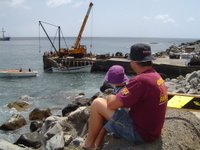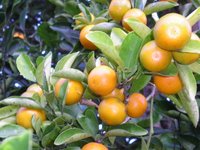 CASCADE PIER
CASCADE PIERThe best stories of history are the ones you hear first hand from those who have lived through them.
The other day at the White Oaks Club, we were chatting about the Island's two piers, Cascade and Kingston. Situated on opposite sides of the island, both are very old, but they have been a lifeline to this island since its first beginnings. In this day and age, when we import so many goods by sea, including food supplies, from Australia and New Zealand and other parts of the world, we tend to forget that there were times when Norfolk Island was quite an exporter of produce.
In the earliest penal settlement, it was hoped that Norfolk Island could become something of a "breadbasket" for the main settlement in Sydney, and in spite of some early difficulties, this island was able to supply many of the needs of the settlement....including coffee, which is being trialled as a cash crop today.
Gilbert Jackson is one of our senior citizens who has worked very hard to create a good life for his family here on his island homeland, and who has served the community as an elected member of the island's government. He frequently comes up with some really interesting reminiscences about earlier days on this island.
Gilbert told us he remembers a time back in the early thirties when the pier at Cascade, and the area behind it would be so crowded that there would not be an inch of room to move. In those days, the "Hinemoa" from New Zealand would call in every fortnight, and would take on board supplies of fruit and vegetables to take back to the markets in New Zealand. When word got round that the ship was in, the islanders would gather together their excess produce....oranges and other citrus, bananas, and sweet potatoes mainly.... and take it down to the pier. Gilbert says you could hardly move for all the people, the horses and carts and the crates and boxes. No doubt it provided some very useful cash for household goods and the like in those days when the island was still very much a semi-subsistence rural economy. Evidently it was especially good to have this commerce in a depression era!

Sadly it all came to an end. Just another episode of a long sequence of boom and bust for this island. The potato growers in Tasmania began to complain about the fact that Australia was importing potatoes from New Zealand. And so the practice came to an end, in order to protect the local Tasmanian industry.
In retaliation, New Zealand said that it would cease importing any fruit and vegetables from Australia. Because of its connection with Australia, Norfolk Island became caught up in that ban, and thus the island lost an important market for its products. This must have been a bit of a blow to the Norfolk Island growers, but at least they still had food on the table in that Depression era.
I did love the colourful picture that Gilbert created of a busy bustling pier. I can imagine the island men standing round comparing the size of their sweet tatie, the women bringing down tea and "wetls" to keep them going, and the children lending a hand with the boxes and bunches of "plun" (bananas) in between chasing and hiding, and gathering hi-hi (periwinkles) off the rocks.
Cascade Pier is still a busy bustling place today when there is a ship in, but nowadays we are more interested in what is being unloaded...groceries, household goods, stock for the tourist shops and vehicles. Occasionally there is an animal (horse or cow) to be brought ashore, and sometimes something really large like a bus.
We still grow all the fruit and vegetables we use ourselves, and do not import any fresh produce........except potatoes, onions, garlic and ginger, and they mostly come in from New Zealand!!
No comments:
Post a Comment